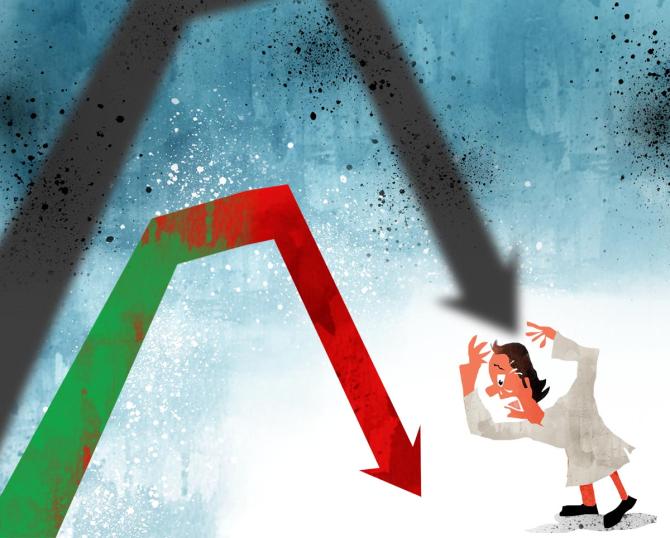'The selling in India may emerge as soon as the RBI reverses its interest rate stance.'

Jigar Shah, CEO, MIB Securities India, tells Puneet Wadhwa/Business Standard that retail money inflows into markets would decline with the start of interest-rate expansion.
What's your view on how the markets have played out thus far in 2022?
Global markets are reeling from the pressure of commodity price inflation; several country indices are down -- ranging from mid-single digit to mid-teens on a year-to-date (YTD) basis.
In comparison, the Nifty and the Sensex have fallen only slightly, reflecting little concern about high inflation/interest rates hurting corporate performance for 2022-2023.
The relatively better performance of Indian equities is driven by -- a. Overwhelming participation and inflow of retail investors, pouring in over $20 billion in the past year and offsetting the foreign selling to a great extent; b. No change in interest rates and hence no shift in fund flow into the higher-yielding debt markets from equity.
The overall investor expectation is that the Indian economy will deliver 7-8 per cent growth, coupled with high double-digit earnings growth reflected in the upbeat investor sentiment and liquidity.
Can the Sensex and the Nifty give double digit returns in 2022 if the war clouds abate over the next couple of months?
This seems highly unlikely, if not impossible.
Even if the war ends soon, there are going to be some long-term repercussions in terms of global trade, expansion of economic sanctions on countries supporting Russia, and continued challenges with the supply chain issue which started during the pandemic.
Bond yields being well above the earnings yield on equities also do not augur well for the markets, in general.
However, large tech companies and other large companies across sectors, which are working on low carbon transition, would generally do well because they would grow faster than peers and would also reduce risk.
We are overweight on software, telecom, tractors, two-wheelers and private banks.
We are underweight on cement, contractors, and non-banking financial services (NBFCs).
Do you see another round of sell-off in the equity markets by FIIs once the US Fed starts to wind down its balance sheet?
A good amount of selling may be over, but some more may take place along with the US Fed unwinding and also based on the overall macro data -- inflation, interest rates, corporate earnings, and GDP expansion in India.
The selling in India may emerge as soon as the Reserve Bank of India reverses its interest rate stance and guides the possible extent of the rate expansion cycle -- 100 basis points (bps) or more.
This shall trigger a shift in fund flow to debt/fixed income as yields become more attractive and can trigger some equity redemptions, as well.
However, if there is a positive surprise in terms of a normal monsoon, coupled with the global crude price below $100 per barrel, the sell-off may not be very aggressive.
We maintain our Nifty 50 target of 14,660 based on 17-18x one-year forward P/E ratio, if the worst case plays out.
Some experts are again warning of supply chain disruptions. Have the markets and India Inc factored all this in?
Supply chain disruptions are a reality already, especially when you look at the waiting periods for some SUV models, consumer electronics, computer hardware, etc.
This is resulting in product price inflation and is also driving labour shortage and wage inflation. This is not factored into analysts' estimates.
Russia and Ukraine remain large producers of oil and gas, metals and food grain and the disruption in both countries would curtail the global supply of these commodities.
As of now, there is no reliable estimate on how and when this disruption will normalise.
We estimate reduced earnings growth for Q4FY22 and FY23 for corporate India with the exception of private banks and telecom.
Do you see the brisk pace of retail money that is pouring into the primary and secondary markets continue in FY23?
The pace of retail money would come down once the interest-rate expansion cycle begins.
Also, if equity market returns remain negative for a longer period, it will discourage greater retail participation.
Historically, the maximum retail investor participation had been reported when the markets were booming.
However, it is clear that with the advent of easier and cost-effective online investing options, the number of people entering the markets will continue to expand.
Some companies, especially those in the new economy, tech-driven but without a track record of profits, need to wait for some time as the sentiment is not conducive for such IPOs and the investor appetite will be more for well-established, cash-generating and dividend-paying companies.
IPO-bound companies also need to price their issue so as to leave some money on the table for investors, which has not been the case with several IPOs in the past year or so.
Feature Presentation: Aslam Hunani/Rediff.com











